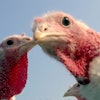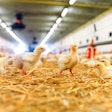
The U.S. Centers for Disease Control and Prevention (CDC) and public health and regulatory officials in several states are investigating a multistate outbreak of Salmonella Reading infections linked to raw turkey products. The U.S. Department of Agriculture’s Food Safety Inspection Service (USDA-FSIS) is monitoring the outbreak.
As of July 11, 2018, 90 people infected with the outbreak strain of Salmonella Reading have been reported from 26 states.
Illnesses started on dates from November 20, 2017, to June 29, 2018. Ill people range in age from less than 1 year to 91, with a median age of 41. Sixty-one percent are female. Of 78 people with information available, 40 (51 percent) have been hospitalized. No deaths have been reported.
Investigation of the outbreak
In interviews, ill people answered questions about the foods they ate and other exposures in the week before they became ill. Of 61 people interviewed, 37 (61 percent) people interviewed reported preparing or eating turkey products that were purchased raw, including ground turkey, turkey pieces, and whole turkey. Ill people reported buying many different brands of raw turkey products from multiple stores. Also, two of the 61 ill people interviewed became sick after pets in their home ate raw ground turkey pet food. Three of the 61 ill people interviewed worked in a facility that raises or processes turkeys, or lived with someone who did.
The outbreak strain of Salmonella Reading has been identified in samples from raw turkey pet food in Minnesota, from raw turkey products from 19 slaughter and 6 processing establishments, and from live turkeys from several states. The samples collected by FSIS at these slaughter and processing establishments were part of FSIS’ routine testing under the Salmonella performance standards. Furthermore, whole genome sequencing (WGS) showed that the Salmonella strain from these samples is closely related genetically to the Salmonella strain from ill people. This result provides more evidence that people in this outbreak got sick from preparing raw turkey products.
WGS analysis did not identify predicted antibiotic resistance in 68 isolates from 28 ill people and 40 food and animal samples. However, 33 isolates from ill people and 49 isolates from food and animal samples contained genes for resistance to all or some of the following antibiotics: ampicillin, streptomycin, sulfamethoxazole, tetracycline, gentamicin, and kanamycin. Testing of four outbreak isolates using standard antibiotic susceptibility testing by CDC’s National Antimicrobial Resistance Monitoring System (NARMS) laboratory confirmed these results. This resistance likely will not affect the choice of antibiotic used to treat most people since these antibiotics are not normally used to treat Salmonella infections.
Available data indicate that this strain of Salmonella Reading may be present in live turkeys and in raw turkey products. A single, common supplier of raw turkey products or of live turkeys has not been identified.
CDC and USDA-FSIS shared the results of the investigation with representatives from the turkey industry to make them aware of the outbreak and resulting illnesses, and to ask them about steps they may be taking to reduce Salmonella contamination. Because investigation results suggest this strain of Salmonella Reading is present in live turkeys and in raw turkey products, further investigation and interventions to reduce the prevalence of this strain should target both the live turkey industry and turkey processing facilities. Consumers should be aware that raw turkey may be contaminated with germs and consumers should always follow steps to prevent Salmonella infection from these products.


















